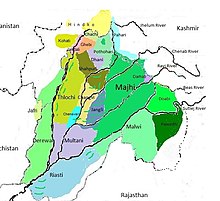Puadhi (Gurmukhi: ਪੁਆਧੀ; IAST: [puādhī], sometimes spelled as Poadhi, Powadhi, or Pwadhi) is an eastern dialect of the Punjabi language primarily spoken in the Puadh region of northern India.[1] It is spoken between the Sutlej and Ghaggar river basins in the present day states of Punjab and Haryana, and the union territory of Chandigarh and Uttar Pradesh.
| Puadhi | |
|---|---|
| Powadhi | |
| ਪੁਆਧੀ پوادھی | |
| Pronunciation | Powadhi |
| Native to | India |
| Region | Puadh of eastern Punjab, Haryana, Western Uttar Pradesh |
| Ethnicity | Punjabi (Puadhi) |
| Gurmukhī | |
| Language codes | |
| ISO 639-3 | – |
| Glottolog | powa1244 |

Puadh extends from Rupnagar near Satluj up to the Ghaggar river and its tributaries, Markanda and Som in the east, which lie in northern Haryana up to Kala Amb in Nahan district of Himachal Pradesh.
To the west it extends into the Puadh tract of Ludhiana where the westernmost spoken varieties of the Puadhi dialect form a continuum with Malwai and in north it blend with Doabi[2] Puadhi's western boundary also extends into Fatehgarh Sahib and Patiala districts and its influence is observed in the southwest in the adjacent areas of Kaithal and Kurukshetra districts up to northern areas of Jind distinct such as Ujhana and Dhamtan Sahib.
The language is spoken over a large area in present Indian Punjab as well as Haryana. Puadhi is also spoken in other areas: Kharar, Kurali, Zirakpur, Derrabassi, Lalru, Rupnagar, Morinda, Chandigarh, Pail, Rajpura, Samrala in Punjab as well as Ambala, Naraingarh, Sadaura, Panchkula, Raipur Rani, Barwala, Shahabad, Barara, Thana Chappar, Bilaspur, Saraswati Nagar, Pehowa, North of Kaithal and Tohana etc. in Haryana.
Grammar
edit- Genitive postposition: The genitive case particles of ਕਾ kā, ਕੀ kī, ਕੇ ke and ਕੀਆਂ kiān are found in Puadhi, as compared to most other dialects which use ਦਾ dā, ਦੀ dī, ਦੇ de and ਦੀਆਂ diān. Puadhi shares this grammatical trait with neighbouring dialects of Bangru and Bagri. In Punjabi, this form of second case is also observed intermittently in villages that speak Malwai.
- Ablative postposition: ਤੇ te is the Puadhi equivalent of Majhi ਤੋਂ ton, similarly ਗੇਲੇ gele is used instead of ਨਾਲੋਂ nalon.
- Topic marker: In addition to ਤੇ te and ਤਾ ta, ਤੋ to and ਤੌ tō are also commonly used. The latter ਤੌ is pronounced as a diphthong when emphasized. All four nominative particles are the same in Puadhi as in Bangru, which is spoken to its immediate south.[citation needed]
Vocabulary
editThe Puadhi dialect has many words that differ from other dialects of Punjabi.
Examples
edit| Puadhi | Pronunciation in Puadhi | Meaning | Equivalent Majhi word |
|---|---|---|---|
| ਈਬ ابّ | [īb] | now | ਹੁਣ ہُݨ |
| ਮ੍ਹਾਰਾ مہارا | [mhārā] | our / ours | ਸਾਡਾ ساڈا |
| ਥਾਰਾ تھارا | [thārā] | your / yours | ਤੁਹਾਡਾ تہاڈا |
| ਯੋ یو | [yo] | this | ਇਹ ایہہ |
| ਨਿਊਂ نیونہہ | [nyūn] | such / like this | ਯੋਂ یونہہ |
| ਛੋਕਰਾ چھوکرا | [chokrā] | boy | ਮੁੰਡਾ منڈا |
| ਗੈਲ گیل | [gail] | with | ਨਾਲ نال |
| ਹਮੇ ہمیں / ਹਮ ہم | [hamē] / [ham] | we | ਅਸੀਂ اسیں |
| ਥਮੇ تھمیں / ਥਮ تھم | [thamē] / [tham] | you | ਤੁਸੀਂ تسیں |
| ਗਾਰਤੀ گارتی | [gārtī] | quickly | ਛੇਤੀ چھیتی |
| ਲਾਗ لاگ | [lāg] | near | ਨੇੜੇ نیڑے |
| ਬੋਹਤਾ بوہتا | [bōhtā] | much | ਬੜਾ بڑا |
| ਪਾਲ਼ਾ پالا | [pāɭ̆ā] | cold weather | ਠੰਡ ٹھنڈ |